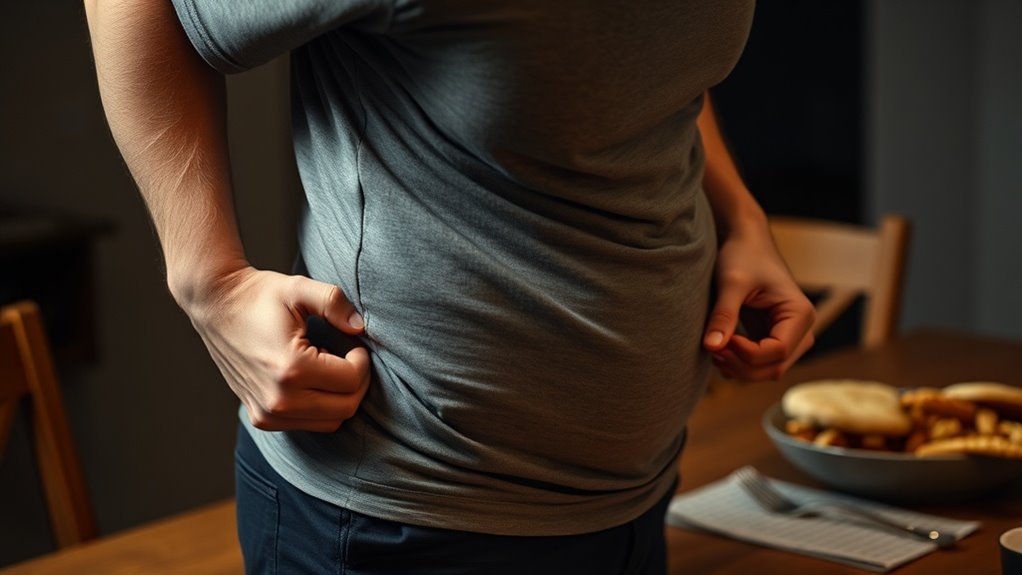Feeling Stressed. These Habits May Be Causing Weight Gain
Feeling stressed can definitely lead to weight gain. Stress boosts cortisol levels, which encourages fat storage, especially around your midsection. It also triggers emotional eating, making you crave unhealthy, high-calorie comfort foods. Lack of sleep from stress further disrupts hunger-regulating hormones, leaving you feeling tired and craving more snacks. Plus, stress often reduces your motivation to exercise. By addressing these habits, you can manage stress and its impact on your weight effectively. There’s more to uncover about how to tackle these challenges.
Understanding the Stress-Weight Gain Connection
How does stress really affect your weight?
When you’re stressed, your body releases cortisol, a hormone that can lead to increased appetite and cravings for unhealthy foods. This makes weight management tougher. You might find yourself reaching for sugary snacks or high-calorie comfort foods, contributing to weight gain. Additionally, stress can disrupt your sleep, lowering your energy levels and making it harder to exercise. Recognizing how stress impacts your weight allows you to take proactive steps. Prioritizing sleep can help regulate the hormonal balance affected by stress, supporting weight management efforts.
Emotional Eating Triggers
Emotional eating often kicks in during stressful moments, as you seek comfort in food.
Triggers can include loneliness, boredom, or anxiety, leading you to consume snacks without even realizing it.
You might find yourself indulging in sweets or savory treats to escape overwhelming feelings.
Recognizing these triggers is crucial; it’s the first step toward a healthier relationship with food.
Instead of turning to snacks, try journaling or taking a walk to process your emotions. A three-minute mindfulness practice can also help you resist cravings and reconnect with your body.
You’re not alone in this journey, and change is possible!
The Role of Sleep Deprivation
Have you ever noticed how a lack of sleep can make you crave unhealthy foods? Sleep deprivation disrupts your hormones, leading to increased hunger and cravings for sugary snacks. When you’re tired, your body struggles to regulate appetite, making it easier to reach for that bag of chips instead of a nutritious meal. Prioritizing sleep can help you regain control over your cravings and weight. Additionally, understanding how hormone levels fluctuate during sleep can further illuminate the connection between sleep and weight management.
| Effects of Sleep Deprivation | Solutions |
|---|---|
| Increased hunger hormones | Set a sleep schedule |
| Cravings for junk food | Limit screen time before bed |
| Decreased energy levels | Practice relaxation techniques |
Sedentary Lifestyle and Stress
When you lead a sedentary lifestyle, it can take a toll on both your physical health and your stress levels.
Inactivity often leads to comfort eating as a way to cope with stress, creating a cycle that’s tough to break.
However, incorporating even small amounts of exercise can serve as a powerful tool for managing stress and improving your overall well-being. Strength training is particularly beneficial as it not only reduces stress but also boosts metabolism.
Impact of Inactivity
Although many people may not realize it, a sedentary lifestyle can significantly amplify stress levels and contribute to weight gain.
When you spend long hours sitting, your body’s stress response kicks in, leading to increased cortisol levels.
This hormone can hinder your metabolism and encourage fat storage, particularly around your midsection.
Additionally, inactivity can leave you feeling fatigued and unmotivated, making it even harder to engage in physical activity.
Stress-Induced Comfort Eating
How does stress lead you to reach for comfort food?
When you’re overwhelmed, your body craves quick energy, often found in sugary or fatty snacks.
This response is biological; stress triggers the release of cortisol, which can heighten cravings.
You might find yourself snacking mindlessly while binge-watching TV or scrolling through your phone, reinforcing a sedentary lifestyle.
This cycle can lead to weight gain, as the calories consumed don’t fuel active living.
Recognizing this pattern is the first step.
Instead of reaching for that bag of chips, consider healthier alternatives that satisfy cravings without the guilt.
You’ve got this!
Exercise as Stress Relief
Exercise serves as a powerful antidote to stress, transforming tension into energy and frustration into focus.
When you move your body, you not only improve your physical health but also elevate your mood.
Here’s how exercise helps:
- Releases endorphins, your body’s natural mood lifters
- Reduces levels of the stress hormone cortisol
- Improves sleep quality, helping you recharge
- Boosts self-confidence through physical achievement
- Encourages mindfulness, keeping you present
Hormonal Imbalances and Weight Gain
Have you ever wondered why, despite your best efforts to eat well and stay active, those extra pounds just won’t budge?
Hormonal imbalances might be the culprit.
When stress hormones like cortisol rise, your body can store fat, especially around your midsection.
Insulin resistance can also occur, making it harder to regulate blood sugar and prompting cravings for unhealthy foods.
Thyroid issues may slow your metabolism, further complicating weight management. Additionally, intermittent fasting may help some individuals manage their weight by promoting mindful eating during designated eating periods.
Coping Mechanisms That Backfire
When stress hits, it’s easy to turn to coping mechanisms that seem comforting but can actually backfire. You might find yourself reaching for comfort food, slumping into a sedentary lifestyle, or sacrificing sleep—all of which can lead to weight gain. Recognizing emotional triggers is the first step toward healthier coping strategies that truly support your well-being.
Emotional Eating Triggers
Why do so many people turn to food for comfort during stressful times?
Emotional eating often acts as a temporary escape, but it can lead to weight gain and regret.
Recognizing your triggers is essential for breaking this cycle.
Here are some common emotional eating triggers:
- Stress from work or personal life
- Feelings of loneliness or boredom
- Celebrating achievements or milestones
- Social gatherings with food as the centerpiece
- Negative self-talk or low self-esteem
Sedentary Lifestyle Patterns
How often do you find yourself opting for the couch instead of a workout when stress levels rise?
It’s tempting to trade in your sneakers for Netflix, but this sedentary lifestyle can backfire.
While resting might feel like a relief, it often leads to weight gain and increased anxiety.
Physical activity is crucial for managing stress and improving your mood.
Instead of sinking into the couch, consider a brisk walk or a quick workout.
Even small movements can help boost your energy and alleviate stress.
Sleep Deprivation Effects
Have you ever noticed how lack of sleep can sabotage your best intentions?
When you’re sleep-deprived, your body craves quick energy sources, leading to unhealthy snacking and poor food choices.
This can spiral into weight gain, making you feel even more stressed.
- Increased cravings for sugary foods
- Slower metabolism
- Heightened stress hormones
- Impaired decision-making
- Reduced motivation for exercise
Prioritizing sleep isn’t just about rest; it’s a crucial part of managing stress and maintaining a healthy weight.
So, try to establish a consistent sleep routine and create a calming bedtime environment.
Your body will thank you!





